The Amazing Story of Wojtek, the Soldier Bear
How did a Starving Brown Bear Cub become a Corporal in the Polish Armed Forces?
In 1944, when the Allied Forces captured the impenetrable Mountain Fortress at Monte Cassino, in Italy, Wojtek the Warrior Bear fought with fearless dedication to help secure the legendary victory. But just how did an orphaned brown bear cub from the heartlands of Iran rise to the rank of Corporal in the Polish Armed Forces to play his part in one of the bloodiest battles of World War II?
This is the tale of Wojtek, the Soldier Bear, whose rags-to-riches life story is one of the strangest incidents of a war that, between 1939 and 1945, brought out the very best and worst in all it touched. Throughout his honourable service in the Polish military, Wojtek raised company morale with his good nature, fought with courage, and always carried more than his fair share.
The Early Days
Sometime in early 1942, in an unknown corner of the former Persian Empire, a tiny brown bear cub’s mother was shot to death by local hunters, leaving the cub an orphan in a world at war. The hunters took away his mother, and after butchering her for meat, they sold off her fur. The young bear cub was left alone in the arid landscape of Iran, wandering without any chance of survival, let alone a life of heroic fame.
After some days, the little bear cub was found scratching desperately in the barren ground by some young children, who were themselves starving, dirty, and living in destitution. And even though the poor children could not feed their new companion, neither could they leave him behind to die alone in the desert, so the bear cub joined their motley troupe. As they walked on through the desert together, already feeling the ravages of war, the tiny bear cub was slowly wasting away with them; and things were looking desperate for the bear cub and the children.
The Stars Shift & Fate Smiles
One fateful evening, a group of Polish soldiers from the Anders’ Army were out looking for alcohol, food, and other supplies in the dusty countryside of Iran; just like off-duty troops all over the world are apt to do during their precious hours of freedom. But on this particular night, they came across something very unusual, a group of destitute children who had with them a tiny, starving bear cub on a string.
The bear has always had a special place in the hearts of the Polish people, and the soldiers immediately set about negotiating the purchase of the tattered little cub. The children bargained ferociously, realising this might be their best opportunity to make some money for a long time to come. Eventually, after some haggling that would make a Bedouin proud, the children parted with the bear cub for a few dollars, some chocolate, a pocket knife, and several of the men’s wristwatches - a genuine king’s ransom in that time and place.
The Anders’ Army
Following the signing of the Sikorski-Mayski agreement and the beginning of Operation Barbarossa, during the hot months of July 1941, only weeks after the war between the Soviet Union and the Third Reich had begun, the Andres’ Army was formed.
The Army was made up of Polish citizens, many of whom had experienced terrible interrogations by the NKVD, spent years in the Gulag system, and been deported from their homelands to the labour camps of Siberia.
The army was named after its top commanding officer, Major General Wladyslaw Anders. Officially, the army was under the command of the exiled Government of the Republic of Poland but operationally they were instructed by the High Command of the USSR.
General Anders himself had been captured and detained by the NKVD, undergoing interrogations that lasted many long weeks. He was held in the infamous Lubyanka prison in Moscow, one of the most feared torture chambers in the whole of the Soviet Union.

Alexander Solzhenitsyn, who recorded the testimonies of so many who experienced the Soviet Gulag system in his book The Gulag Archipelago, wrote of Lubyanka prison,
“And at the Lubyanka in 1926 (according to the testimony of Berta Gandal) they made use of the hot-air heating system to fill the cell first with icy-cold and then with stinking hot air. And there was an airtight cork-lined cell in which there was no ventilation and they cooked the prisoners. The poet Klyuyev was apparently confined in such a cell and Berta Gandal also. A participant in the Yaroslavl uprising of 1918, Vasily Aleksandrovich Kasyanov, described how the heat in such a cell was turned up until your blood began to ooze through your pores. When they saw this happening through the peephole, they would put the prisoner on a stretcher and take him off to sign his confession.”
This was, however, just one of the countless methods of obtaining a confession in the nightmare halls of the Lubyanka prison of Moscow, and by the 1940s, many new techniques were in common use.
When the Anders’ Army was formed and dispatched it was extremely undermanned, and never even had full battalions. Despite this, Anders’ Army went on to earn a reputation for courage and effectiveness that was nearly unparalleled in a war that was never short of heroes.
In 1942, when the Anders’ Army was sent to Iran it totaled 66,000 fighting men, but when the Polish civilians who traveled with it were included, the number was closer to 115,000.
Following the deployment of the Anders’ Army, Major General Anders took control of the Polish Armed Forces of the East, overseeing operations in Palestine and Iran. Later, Anders commanded the Polish 2nd Corps, which he led to victory in Italy, in gruesome battles such as Monte Cassino and Acona.
Iran, 1942
After many terrible years under the yoke of the USSR, enduring labour camps and NKVD torture, Iran in 1942 must have felt, despite the war, like a land of freedom for the Anders’ Army. These survivors of the Soviet camps, now heavily armed and well-fed, were tough, crafty, and like swords sharpened against steel — the Polish Armed Forces in the East must have presented a truly formidable fighting force for any potential foe.
The Orphaned Bear Cub is Given Hope, and a Name — Wojtek
The little bear cub was taken back to the unit headquarters and was an immediate hit with the men. The poor bear was seriously malnourished and frightened, but he was soon made to feel at home. He was given plenty to eat and although it must have been strange at first, he soon became used to his new companions.
For the men of the unit, the bear cub was a welcome new brother they could all band around together to help survive in a world that had become brutal, unforgiving and cruel. It is also possible that the scrappy, tattered little bear cub became a metaphor for their own lives, haunted by the Soviet Gulags and torture chambers; and so they put their hearts and souls into keeping him safe and well. The little bear was a natural fit with the unit, and so, like men at arms all over the world, they vowed never to leave him behind.
Shortly after the bear cub was brought to the camp, it was decided that he would need a name. After some rowdy debate around the campfire, it was decided that he should be called ‘Wojtek’, which means ‘soldier’ in Polish.
And so little Wojtek had become a conscript, at least informally, and a cadet of the 22nd Artillery Unit of the Polish Armed Forces of the East.
Wojtek thrived as he learned about life in the military camp. Many of the soldiers would save him parts of their rations, to ensure he never went hungry, and he always had a safe place to sleep at night.
The men would gather around the tiny bear and as his appetite grew his personality began to shine through too. Wojtek loved to take baths and play under the water tap in camp. He used a lot of water but the unit made certain allowances for their new conscript.
Life in Camp
Wojtek’s life in camp was a constant stream of escapades, much to the joy of all. The unit loved their new companion and he became something of a local celebrity. Everyone would share their rations with the growing bear while he quickly learned new tricks to impress his friends. He was cheeky and playful, fun-loving and kind. He loved to wrestle with the men and would sit with them around the campfire every night.
Wojtek was a friendly bear and soon became buddies with the other animals in the camp. Wojtek, with his big hugs and kind spirit, was also popular with the ladies of the Unit!
Wojtek had really settled into the routines of military life with the Anders’ Army, and things around the camp just wouldn’t be the same without him. And so, when the unit was moved from Iran to Palestine, it was only natural that Wojtek went with them.
While in Palestine, waiting on their call to duty in Europe, Wojtek gave the men rides on his back and never lost his love of play fighting. He was growing huge and strong but he never scratched or bit the men while they wrestled and was always careful not to hurt anyone. He was the life and soul of the party and would drink beer bottles in one gulp, and on one occasion Wojtek even ate 300 hundred apples in one sitting.
But it wasn’t all fun and games because Wojtek also worked hard to help the unit. He would carry logs for the campfire as well as massive boxes of ammunition and anything else that he could help with.
Wojtek had grown up with the artillery unit and was part of the military family now. So when the call came to cross from Palestine into the centre of the European war, it was out of the question that he would be left behind. However, Wojtek couldn’t get passage on board the military transport ship unless he was officially enlisted as a soldier in the Polish Armed Forces.
In order to solve the problem of Wojtek’s passage on the ship to Europe, the Commander enlisted Wojtek as a Corporal in the 22nd Artillery Unit of the Anders’ Army. Wojtek received an official ration book and a salary that would be paid to him in food and beer.
Besides his rations, Wojtek also had certain other perks, being the only bear in the unit. For instance, he was the only member of the Polish Armed Forces who could get away with drinking beer in camp, roughhousing with the men, and sleeping during the day! Even so, Corporal Wojtek always saluted senior officers and would practice marching with the men during parade ground drills.
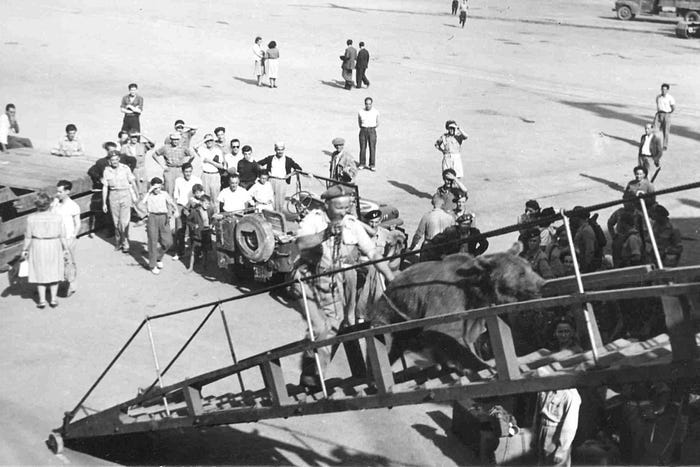
The War in Europe
The Battle of Monte Cassino was one of the bloodiest battles of the war. Four units had already tried and failed to assault the impenetrable German fortress. Dug into an old monastery on the mountaintop, it seemed as if the devil himself had taken up residence and was determined not to leave.
Initially, Wojtek stayed in the rear lines as instructed, but as the battle heated up, he rushed into the action. Fearlessly, he wanted only to help the men of his unit by doing what he did best - carrying heavy things and raising company morale.
Without being ordered, Wojtek launched himself into the chaos of battle, carrying boxes of shells weighing over 100 pounds each, which would usually take four men to carry. He carried these vital supplies of mortar shells forward to the gun embankments on the front lines, sheltering along the way from incoming fire with the other men in the trenches and dugouts.
He continued helping right through the battle, and having found his role in the unit he worked relentlessly, with all his might. And so even when the odds seemed impossible, Wojtek was still by the side of his brothers in arms.
The battle was terrible, and many men died on both sides, but Wojtek and the 22nd Artillery Unit went on, with their Allied support, to finally take the mountain fortress of Monte Cassino. The unit won many more victories during the last year of the war, and all the while Wojtek continued to carry shells up to the front lines in every battle they fought.
After the War
The war had been long and hard and the Anders’ Army had traveled all over the Middle East and Europe by the time it was over, with Wojtek by their side the whole way; growing from a tiny, hungry bear cub, into a formidable warrior, ancillary troop, and well respected Corporal in the Polish Armed Forces.
After hard fighting and legendary successes, all with the help of their Warrior Bear, the 22nd Artillery Unit of the Polish Armed Forces changed their regimental insignia to a bear carrying a huge shell, to commemorate Wojtek’s inspirational bravery under fire.
Wojtek and the surviving men of the unit traveled on to Glasgow, Scotland, to recuperate, getting off the ship in the docks together, tired and weary after the war.
Now that the war was over, like the rest of the unit, Wojtek was disbanded, and the men all went their separate ways, back to what was left of their homes. Wojtek, who had already become a local Scottish celebrity, settled down in the Edinburgh Zoo, to live out his days meeting adoring visitors who flocked to see him. Best of all, Wojtek got regular visits from his old war pals, who would jump straight into the enclosure and wrestle, drink bottles of beer, and reminisce with their old war buddy. Wojtek never forgot his days in the Polish Armed Forces, and every time he heard visitors to the zoo speaking in Polish he would stand up and salute them.
When Wojtek died, in December of 1963, his death was announced on the BBC Radio. He was 500 kg in weight and 6 foot tall. The amazing life of Wojtek, the brave soldier bear, who went from a starving orphan cub in the deserts of Iran to a Corporal in the Polish Armed Forces, before retiring as a celebrity in a comfortable zoo in Scotland, is memorialized by a recently unveiled statue in Princes Street Gardens, Edinburgh.






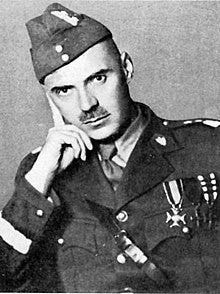
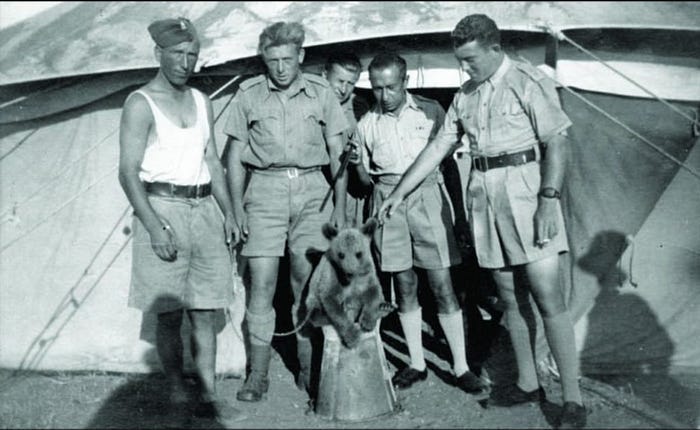
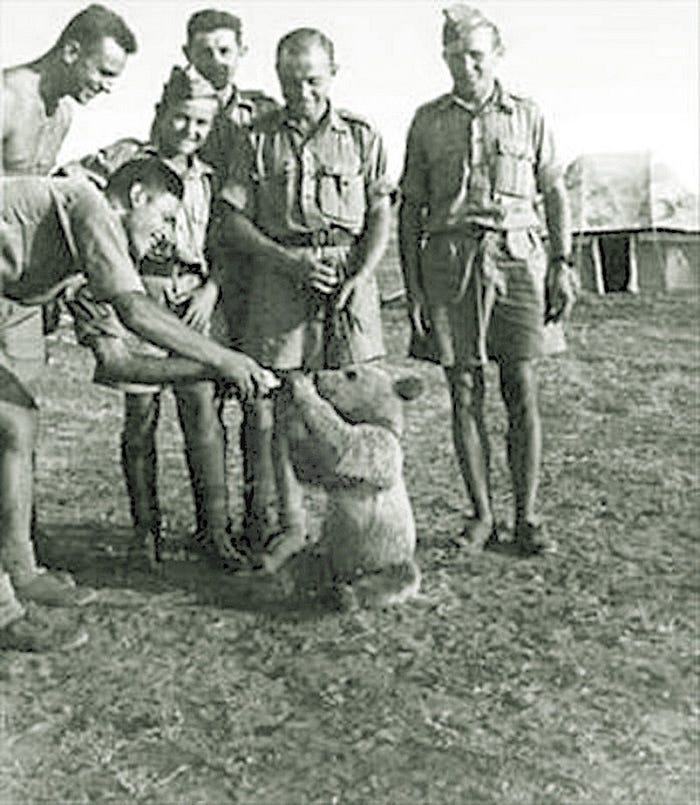
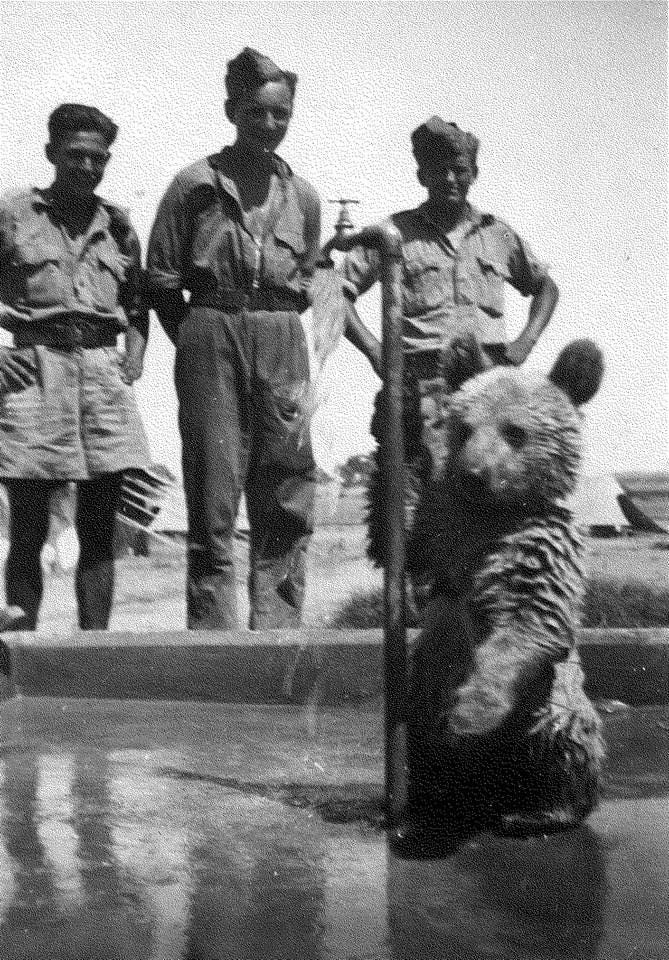
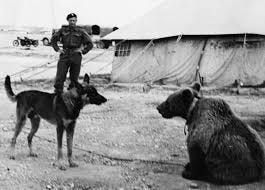









This was a good story with surprises. You're terrific getting all the graphics and emotion into writing, special storyteller, friend!